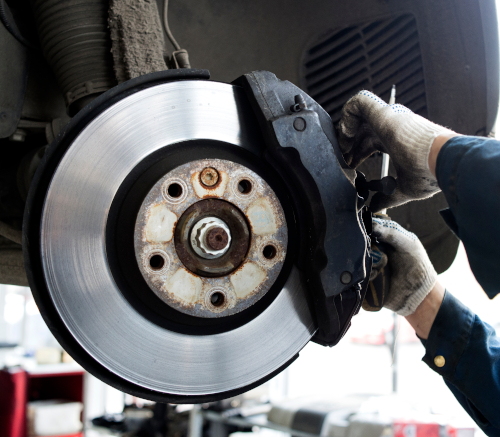Worn or damaged brakes make driving very dangerous, as they reduce your ability to control your vehicle’s speed. Your Shiloh, IL CDJR dealer offers trained, factory-certified technicians who are experts at brake repair, and we can fix any problem for you. These are some signs that you may need to visit us very soon.

Braking Vibrations
The first sign of problems with your brakes involve vibration when you step on the pedal. A set of calipers is positioned above each wheel rotor. When you hit the brakes, the calipers grab both sides of their rotor. Brake pads installed inside the calipers then generate friction against the rotors, and this friction brings your wheels to a stop. The rotor surface is smooth and flat, which allows the calipers to easily grab and hold the rotor. If you feel vibrations when you brake, one or more of the rotor surfaces are probably uneven.
This can be caused by a worn rotor or from adhesive on the pads drying on the rotors. The adhesive that holds the friction material on the pads can liquify and spray across a rotor. This dries and forms an irregular surface. The vibrations are caused by a caliper grabbing the irregular surface. We can fix this issue by cleaning the affected rotor or resurfacing it.
Soft Brake Pedal
The braking system uses brake fluid to provide the hydraulic pressure that stops your vehicle’s wheels. When you step on the brake pedal, you can feel the resistance produced by the fluid. As you put more pressure on the pedal, the resistance you feel grows and the system reacts faster. If you feel very little resistance when you press down on the pedal, this is a sign that something is wrong.
The lack of resistance means there’s a lack of pressure in the system. This could be caused by a brake fluid leak, which automatically reduces the pressure as you lose fluid. It could also be caused by a blockage of the brake hoses or by a damaged brake master cylinder, the component that controls the braking system. Our technicians will identify the cause of the fault and repair it.
Overheating Brake Fluid
As we’ve seen, the braking system operates under high pressure, and high pressure generates heat. If you’ve had to brake frequently in a short space of time, for example, if you’re driving down a winding road, the brake fluid will grow hotter. If the brake fluid gets hot enough, the brake fluid can overheat.
Overheating brake fluid produces a foul chemical smell, and you’ll feel your brakes become less responsive. The reduced response is caused by hot brake fluid losing its ability to generate hydraulic power. We advise pulling over ASAP and allowing your brakes to cool. We’ll examine your brakes, identify the cause of the problem, and repair it.
Your brakes are the single most important safety feature on your car. Keeping them in good shape is essential to your security on the roads. Don’t risk an accident. Visit the service department at Auffenberg CDJR in Shiloh, IL, today.







